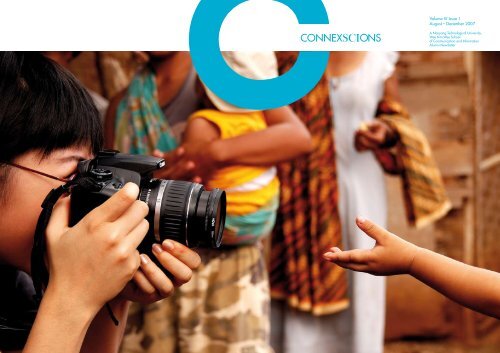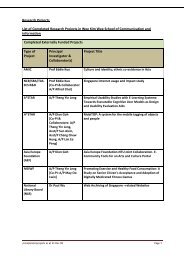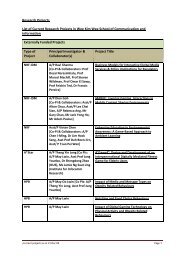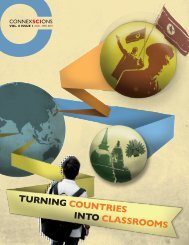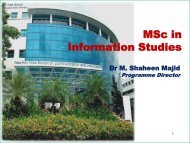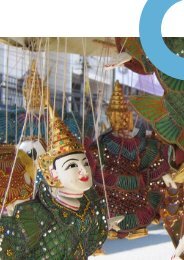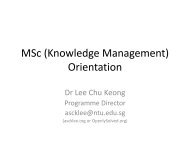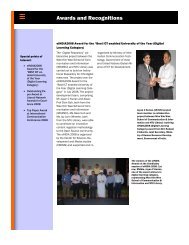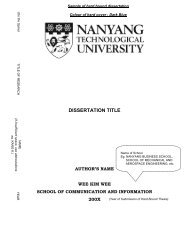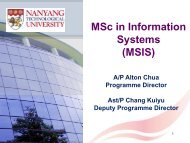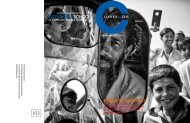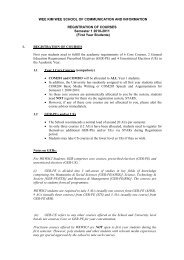connexscions - WKWSCI Home - Nanyang Technological University
connexscions - WKWSCI Home - Nanyang Technological University
connexscions - WKWSCI Home - Nanyang Technological University
Create successful ePaper yourself
Turn your PDF publications into a flip-book with our unique Google optimized e-Paper software.
Volume IV Issue 1August – December 2007CONNEXSCIONSA <strong>Nanyang</strong> <strong>Technological</strong> <strong>University</strong>,Wee Kim Wee Schoolof Communication and InformationAlumni Newsletter
ContentsChair’s MessageYang Huiwen, 23, works the ground in Kampong Angke, one ofJakarta’s biggest railway communities.CreditsArt DirectorsJared Lai, Sabina LimEditorsGeraldine Yeo, Nadia Bte Md IsmailPhotographerTan JinliProject ManagersChai Min How, Lee Chaang RuWriters & Layout TeamCarene Chew, Charlene Ho, Fahima Bte Nayib Thalib, DaphneChui, Hashirin Nurin Hashimi, Leow Xue Ling Shallyn, NurIdayu Bt Suparto, Thong Wai Mun, Wee Li LinAdvisorsLim Kim Yang, Dr Angela Mak, Christopher Yaw, Dr Yeoh KokCheowSpecial ThanksDr Ang Peng Hwa, Dr Lee Chun Wah,Dr May Lwin, Mr Ng Heng Ghee<strong>connexscions</strong> is written and produced entirely bystudents. Send us your news to include in the next issue at<strong>connexscions</strong>@ntu.edu.sg.Photo by Johnathan Loh02 Chair’s MessageFeatures04 15 years and a Party06 An Afternoon With The Wee FamilyAwards and Recognitions07 Crowbar Awards08 National Day AwardsProjects & Publications09 24 PURE Talents10 IAMCR Conference10 ICA Conference11 Final Year Projects Go From Strength to Strength13 Knowledge Management: Tools and Techniques Now in2nd Edition13 International Conference on Metadata Applications14 When The Children Cry16 A Land Laos In TimeTeacher’s Notes18 Big Grants – Mobile Tagging19 The Chair’s Instructor19 New EBM Faculty20 New PPC Faculty22 Five New Things About ACRC23 The Researcher, The Family Man23 Prof Zhou Shu Hua is Mr Versatile24 New StaffStudent Life25 Multi-Faceted Graduate Student26 Press Pedia - The New Wikipedia26 My Word! Students Dream Big And Win27 Students Get ProfessionalClass Notes28 Serene Loo28 Donna Wong29 Douglas Hendry, the Unconventional Graduate30 Alumni Updates31 @BrewerksBy the time you receive this, you probablywould have heard the news about the15th anniversary dinner party we had onSeptember 21 — it was a blast.We had an overflow crowd — 430persons turned up. More than 100 whodid not meet the RSVP deadline wereturned away. We could have been moreforgiving of the missed deadline but thehotel room was simply filled to capacity.An overflow room had to be booked.The event marked the 10thanniversary of the graduation of thepioneer batch of 1997. It was also anopportunity to thank five companieswho have offered the School internshippositions from the start. Those who havehelped deserve credit for contributing tothe success of the School.The lessons learnt? CS alum dowant to meet and catch up. We had analumna who was overseas (ok, Malaysia)and came just for the occasion. Andthey want to talk (it was a loud party— but can we expect anything less fromCS grads?) Interestingly, the older thegroup, the noisier they were. Some weresurprised that their business associatesor superiors in the company were CSalumni. Which shows that our CS gradshad quite a bit of weight to throw around— figuratively if not literally.Those who had lost touch wantedto know the progress of the School: weDr Ang Peng Hua.have added a floor to the building; theCI Club has a room at the top floor;there is small reference collection ofmedia materials at the ACRC (AsianCommunication Resource Centre); andof course we continue to attract good,with-it students.For many of you who missed theevent, see pages 4-5 in this issue of<strong>connexscions</strong>. We will also be putting somephotos and videos taken at the dinneronline; and there is a book to mark thedevelopments of the School. This bookis very well put together. In CS tradition,praise and compliments were not allunadulterated in the book. For many,SCS then and <strong>WKWSCI</strong> now has giventhem some of their best memories.Memories are part of our identity.And so we are all a part of each other.I wished I could have met more of you.Perhaps in the next big bash.Ang Peng HwaPhoto by Tan Jinli <strong>connexscions</strong> <strong>connexscions</strong>
featuresClass of 2006.Photos by Tan JinliChair Ang Peng Hwa toasts to 15 years of excellence.15 Years And a PartyStepping into the air-conditioned coldness of the MandarinOriental Singapore, we did not really know what to expect fromsuch a grand occasion.There were local celebrities and media professionals,excitedly waving across the room to former professors, buddiesand classmates. Within minutes of the start of the reception,the entire area was heaving with activity – any outsiders whowalked by must have been wondering what this celebration wasall about. It was, of course, the dinner to commemorate theSchool’s 15th anniversary, held on September 21.The 400 guests included Founding Dean Professor EddieKuo, current and former faculty and staff, alumni and industrypartners. From what we overheard as we spied on conversations,it seems the hottest topics for the night included everythingfrom new-found jobs to recounting antics from school days.Mr Tan Tin Wee (1997) told us with a laugh about some of hisfondest SCI memories. “My significant moments are the reallyembarrassing ones, like standing in front of class during SpeechCommunication and forgetting your lines.”The evening’s official activities kicked off with Chair Dr AngPeng Hwa’s light-hearted opening address, which he claimedwas “presented in headline news format, without the goodlooking news reader.” In his speech, he highlighted the School’saccomplishments and provided updates on the Wee Kim WeeLegacy Fund. Dr Ang also acknowledged the successes of alumniwho have made a name for themselves in the industry. “Asalumni, many of you have proven yourselves to be wonderfulrole models.”After the speech, the School’s 15th anniversarycommemorative book, Coming of Age 92:07, was unveiled. Inrecognition of their contributions, Dr Kuo and Dr Ang wereeach presented with a copy by the book’s editor, former studentMs Nicolette Ho (1997). Associate Professor Dr Lee Chun Wahnoted, “I’m very moved that we are honouring Founding DeanProfessor Eddie Kuo. He played such a critical role in establishingthe School and we are so grateful to him.”On behalf of the pioneer batch of 1997 students,“unconventional” former student, Mr Rodney Koh addressedPhotos by Tan Jinlithe guests. The self-proclaimed “guy who finished at the bottomof the class” is now the producer of Bamboo Pictures, a videoproduction house. He expressed his appreciation toward thefaculty for their encouragement and trust through the years, “eventhough we sometimes didn’t even believe in ourselves.” It was thisencouragement, he jokingly said, that enabled him to stay true tohis interests rather than become a doctor or lawyer.Rodney’s speech definitely seemed to evoke a great deal ofnostalgia among alumni and longstanding faculty as he recountedmemories of yester-year. Even though we were not studentsthen, it was fascinating to hear from him about time spent inthe <strong>Nanyang</strong> Heritage building, and how the pioneer batch hadthe privilege of choosing the colour of their graduation robes. Avideo presentation of the School’s history aroused cheers fromthe audience as they spotted familiar faces. Former student MsJoanne Peh (2005) exclaimed, “I didn’t really realise that we hadso many seniors before us! It feels good to know that I am part ofthis young family that is slowly growing.”Appreciation awards for participation in the ProfessionalInternship Programme were given out to five industry partnerswhich have supported the School for more than 10 years: EdelmanPublic Relations Worldwide, Huntington Communications,MediaCorp, MTV Asia LDC and Singapore Press Holdings.Huntington Communications’ representative Ms Cindy Ng said,“I am quite happy with the students from NTU; they are veryefficient and mature.”It had been a lot of hard work to pull everything together, but,as Head of the Organising Committee Dr Brenda Chan commented,“There was no doubt about the effort being worthwhile when wefelt the warmth and camaraderie in the room.”The evening ended on a high note with stand-up comedienneMs Selena Tan entertaining the audience with song. She enlivenedthe audience with her funny antics and anecdotes about hostelliving. Perhaps the highlight of the evening was when Vice-DeanReminiscing the good old times.92:07 – A walk downmemory lane.A proud member of theWKW SCI family.Dr Hao Xiaoming gentlemanly accepted a dance with the Dim SumDolly, proving that he knew how to enjoy life outside academia.Like a proud father, Dr Ang summed up the essence of whatthe 15th anniversary dinner was about. “It’s always good to seesmart, young people doing well,” he said. “We are both a part ofeach other’s lives in our memories of each other.”WritersGeraldine YeoNadia bte Mohd Ismail <strong>connexscions</strong> <strong>connexscions</strong>
Awards & Recognitioncreativity knows no boundsThe legacy of Mr Wee Kim Wee lives on for the Wee Family and the School.An Afternoon with the Wee FamilyThe air was thick with anticipation and excitement as we awaitedthe arrival of distinguished guests, Mrs Wee Kim Wee and family.Tension broke into smiles as the car approached the lobby. MrsWee was all smiles as she alighted from the car, ever-so-ready forthe camera.Mrs Wee and her daughters were impressed by the School’sfacilities. At the Asian Communication Resource Centre(ACRC),the family signed an autograph book, extending well wishes to theGO-FAR team of 2007.I had the pleasure of having a chat with Ms Wee Eng Hwa,daughter of Dr Wee. The family first visited <strong>WKWSCI</strong> after thelaunch of the Wee Kim Wee Legacy Fund during the Decembervacation last year.big boost in legacy fundLeong Khay Huay Kuan’s $100,000 donation is likely to gotowards the funding of more school-related initiatives like GO-FAR (Going Overseas For Advanced Reporting), launch innovativeprogrammes, support scholarships for needy and deservingstudents, and create new opportunities for students to enrichtheir education.Mrs Wee enjoying the Chronicle.After that visit, she said, “One day I’d like to bring my motherhere while school is in session to have a feel of what the school islike.”When asked about her impressions of the School andstudents, Ms Wee said, “People here are very warm, and we do notregret allowing the name Wee Kim Wee to be associated with thisschool.”Mrs Wee was full of thanks when the session ended. Ms WeeEng Hwa said, “My mother really enjoyed it. She was smiling alot.”After they left, Mrs Wee’s endearing smile still remaineddeeply engraved in our minds.WriterCharlene HoShinnyo-en Buddhist Organisation’s $250,000 donation will beused to establish the Shinnyo-en Singapore <strong>WKWSCI</strong> Scholarships,which will be worth $8,000 annually. Apart from scholarships, thedonation will also be used to fund school activities.WriterJared LaiPhotos by Tan JinliOne year ago, Mr Adrian Yeap Shiqiang (2007) and Ms EsianQuek Yi Xian (2007) took home several prizes from the CrowbarAwards 2006. This year, Ms Cherie Tan Weilin (2007) joinedAdrian and Esian as they each took home trophies from thisever-more-popular advertising awards event.Adrian and Esian clinched one of the biggest awards of theevening, the “Best of Advertising” award. The two former Publicand Promotional Communication (PPC) division students alsowent home with three Gold and two Silver awards. Individually,Adrian won a Silver award, while Esian walked away with oneGold, one Silver and one Bronze awards in various categories.The third prize recipient, Cherie, also a recent graduate fromthe PPC division, received a Bronze award.The Crowbar Awards, inaugurated in 2001, is organised by theAssociation of Accredited Advertising Agents (4As) to recogniseand celebrate young talents in creative communications anddesign. Winning an award from this competition is consideredan important honour, as Esian aptly said: “Finding a job inadvertising is tough. The Crowbar Award actually helps inbreaking in.”The competition attracted 1,136 entries from severalcountries in various categories this year. Dr May Lwin, actinghead of the PPC division said, “In the Advertising Section,<strong>WKWSCI</strong> won the top awards (Best of Advertising and Gold), aswell as a number of other awards, although we had a relativelysmall number of participants this year.”Adrian felt encouraged knowing that he is “more or lessswimming with the big sharks” now that he is working at LeoBurnett as a junior copywriter. Currently working at J. WalterThompson, Esian said: ”There is no end to learning. In theadvertising industry, one still has to learn on the job as there isa lot of stuff that we do not learn in such depth in school.”From left to right: Esian, Adrian and Cherie at The CrowbarAwards 2007.Cherie, who had never heard of the Crowbar Awards untilthe one fateful day last year when she went down to supportAdrian, was inspired by that experience to enter her works thisyear. This time, she left the awards show feeling “very thankful”as she knew that “there are plenty of very good people out thereto compete with.”Adrian added, “I believe this is a very good example ofuniversity students being able to break into advertising.” Whenasked to give some good advice to aspiring future copywritersand people who wish to work in the advertising industry,he replied, “When you work hard enough, you can achieveanything.”WriterDaphne ChuiPhoto by Daphne Chui <strong>connexscions</strong> <strong>connexscions</strong>
PROJECTS AND PUBLICATIONSNational Day AwardsDr Schubert FooPhoto by Tan JinliDr Schubert Foo and Dr Ang Peng Hwa<strong>WKWSCI</strong> is proud that two faculty members receivedSingapore National Day Awards this year.Dr Ang Peng HwaAssociate Professor Dr Ang Peng Hwa, Chair of <strong>WKWSCI</strong>, said itwas a surprise to find out he had been selected. He received thePublic Service Medal for his work with the Consumer Associationof Singapore (CASE) and the Ministry of Trade and Industry(MTI). Dr Ang is a vice-president of CASE and a legal advisor ofthe Advertising Standards Authority of Singapore (ASAS). He cochairedthe MTI committee charged with revising the ConsumerProtection (Fair Trading) Act (CPFTA), in particular, the list ofunfair practices.He commented, “Traders can be very creative in circumventingthe law.” He added his work with the MTI was interesting becauseof the “robust debates” between representatives from the MTIand CASE.His research and work in Internet law and policy also proveduseful when amendments to the CPFTA were discussed. Hesaid, “For the most part, both the CPFTA and the Internet areregulated by citizens who band together to enforce the law. So myresearch has helped inform what can and cannot be done underthe CPFTA.” Recommended changes to the CPFTA are currentlyunder consideration by the Minister of Trade and Industry, andwill be in effect once approval is given.Being selected to receive a National Day Award came as a surpriseto Dr Schubert Foo too. He received the Public AdministrationMedal (Silver), a high award given in recognition of his work in<strong>WKWSCI</strong>.Dr Foo, the associate chair of <strong>WKWSCI</strong>, has been with theSchool since 2002 and has seen it grow in many ways such as thesignificant increase in research activities and the introduction ofoverseas study initiatives. The fondest memories Dr Foo has ofthe School involve his students. He said, “There is satisfaction inseeing them do well in their workplaces.”Dr Foo is well-liked by his colleagues, and known forcreating a light-hearted working environment. Dr Ang Peng Hwacommented, “His jovial disposition helps make meetings seemless long.”Other faculty members praised Dr Foo for his administrationcapabilities that can make seemingly impossible tasks possible,according to Assistant Professor Dr Foo Tee Tuan.Outside school, Dr Foo is the chairman of the National LibraryAdvisory Committee, one of the many roles he plays in “shapingthe information and heritage landscape of the nation”. DoctoralCandidate Ms Intan Azura binte Mokhtar expressed, “He isextremely passionate about the Library and Information Sciences.”In late August, Dr Foo was appointed to be Associate Dean(Academic) of the College of Humanities, Arts and Social Sciences.Such is testament to his standing in the academic community.Dr Ang said, “Schubert is the natural choice for a senioradministration role. I have no doubt that the College as a wholewill benefit from his appointment.”In his new position, Dr Foo will be involved in ensuring theCollege continues to provide quality education and producequality students. Former students have no doubt about his abilityto do so. Ms Song Wenwen (2007) described him as a dedicatededucator, who was always willing to give up his spare time forconsultation, even if it meant going home at 11p.m.Regardless of the recent appointment, Dr Foo will continueto be a part of <strong>WKWSCI</strong>. His latest book, Knowledge ManagementTools and Technique, is featured on page 13.WriterCharlene Ho24 PURE TALENTSSome say the best way to learn is when you are able to apply whatyou have learnt to a real life context. Last semester, 24 <strong>WKWSCI</strong>students got to do just that when they helped conceptualise andorganise the launch of PURE – the first lifestyle magazine thatrevolves around water – as part of a class project for an eventsmanagement course.PURE is a free street magazine produced by the Public UtilitiesBoard (PUB), the national water agency, and aims to reach out tostudents and young working adults. The magazine was launchedon 22 March in conjunction with World Water Day.The students were directly involved in organising the launchevery step of the way, from creating the ideas for the teaseradvertisement and invitation card, down to choosing the fanfaremusic to be played with the arrival of the guest-of-honour, DrAmy Khor, Senior Parliamentary Secretary, Ministry of theEnvironment and Water Resources.The students were organised into four groups overseeingdifferent aspects of event management: Programme, PublicRelations and On-ground Branding, Media and Evaluation. Eachteam had a PUB representative mentoring them, with AssistantProfessor (Adj) Dr Vivien Chiong guiding them.As part of the event, the students faced the challenge ofmaking cold calls to the media, trying to pitch different newsangles to them. They also had a hand in drafting the mediareleases and staging the photograph opportunities.Ms Chan Huiyi said, “We drafted the media release, a list offrequently asked questions and planned the photo opportunities.This experience gave us an opportunity to put theory intopractice.”Mr Yap Kheng Guan, PUB’s Director of 3P NetworkDepartment, said, “The students have done really well withthis event. Many of their ideas are very refreshing. We wantThe 24 PURE talents with Dr Amy Khor at the magazine’slaunch.to connect with Singaporeans, especially the young, and geteveryone interested in water. By working with these youngtalents, we get to tap their ideas. I think they have also learnt alot about water too through this event.”Even when the day’s activities ended, the students werenot done as they had to do a post-event evaluation, where theyanalysed the media coverage of the event and the feedback fromguests. Only then did they heave a sigh of relief.Through the course, they also learnt something else.Angeline Yap said, “We also learnt that water can be enjoyed invarious ways and that we should value our waterways and keepthem clean. We definitely won’t be taking water for grantedagain!”WriterHashirin NurinPhoto courtesy of Dr Vivien Chiong10 <strong>connexscions</strong><strong>connexscions</strong> 11
iamcr conferenceThe students (seen here with Assistant Professor Dr Stella Chia and Assistant Chair Professor Dr Mark Cenite) atthe conference held from July 23-25.Photo courtesy of Lin WeirongICA CONFERENCE<strong>WKWSCI</strong> students made their presence felt yet again at theInternational Communication Association (ICA) conference held inSan Francisco in May this year. The Final Year Projects (FYP) of MsClarice Sim (2007), the group comprising Ms Koh Gui Qing, Mr LimMun Pong, Mr Mohammed Jaleesudeen Jalal and Mr Teh Joo Lin (all2006) and another comprising Ms Liew Mei Yan, Mr Mervin Tay andMs Patricia Wei Ling Yap (all 2006) were selected for presentation.Continuing the long tradition of <strong>WKWSCI</strong> undergraduatespresenting at international conferences, Clarice presented her paperwhile Mun Pong represented his group. Associate Professor Dr HaoXiaoming presented on behalf of Mei Yan, Mervin and Patricia.Clarice, who is now a graduate student at <strong>WKWSCI</strong>, said:“I am very proud to represent the School. Not many studentauthors get to present at international conferences, so I amvery honoured to be one of them. I think the School is proud ofthe work that students do and so very enthusiastic to share it.It is only with this kind of enthusiasm that we get to achievethe things we do.”Mun Pong, who is now working with the Government ofSingapore said, “I felt that this was a once-in-a-lifetime opportunityto sample life as an academic.”Both Clarice and Mun Pong felt that one of the most enrichingexperiences at the conference was getting to meet the authors ofthe textbooks that they read and to actually meet them in reallife was a pleasant surprise. Clarice likened this to “almost likemeeting a superstar.”The ICA is an academic association with a history spanning over50 years and with more than 4,200 members in 70 countries. Its areaof concern includes the study, teaching and application of all aspects ofhuman and mediated communication. It has been officially associatedwith the United Nations as a non-governmental organisation.Associate Professor Dr Hao Xiaoming said, “We use conferenceparticipation as a yardstick to test our education, to see how goodwe are. We are very proud to see our students can compete at thislevel, where even faculty sometimes finds it not easy because thereis so much competition to get papers in.”To <strong>WKWSCI</strong> students, Dr Hao said, “I hope that every paperthey have to write, no matter individual or group paper, is aimedat the highest standards, at least good enough to be submittedto an international conference. The truth is that they are goodenough. The important thing is they need to focus to ensure theywant to reach high standards, rather then simply fulfilling therequirements of the course.”WriterHashirin NurinFYPs Go From Strength to StrengthOLFACTION IN ADVERTISINGSUICIDE SYMPHONYThree groups of final-year Communication Studies (CS) studentswere selected to present their research papers at the prestigiousInternational Association of Media and Communication Research(IAMCR) conference held in Paris in July.Presented at the Emerging Scholars Network session of theconference, the three papers were the students’ research projectsfor the Audience Research Methods course conducted by AssistantProfessor Dr Stella Chia. The topics explored the online habitsand attitudes of individuals towards news-reading, gaming anddating.Despite previous experience presenting in class, presentingto an audience of mostly graduate students and academics waschallenging. Ms Chong Wai Yin, who presented her group’s paper“Exploring online news reading patterns among college studentsin Singapore” said, “It was nerve-wracking.” Other members of herproject group were Ms Cheong Poh Kwan, Ms Grace Kwan Chi Enand Ms Kym Yeo Yun Ling.Mr Lin Weirong noted, “They thought we were Mastersstudents because they didn’t expect undergraduates to bepresenting. Overall, we had a fun networking experience.” Hisgroup’s paper, “Why do they play? A uses and gratificationsapproach for examining MMORPG players” was written togetherwith Mr Stanley Lim Chern Fong and Mr Ng Kong Yong.The conference also exposed the students to an array ofstimulating research and lively debates. “It’s very nice that we gotto be there physically and be exposed to these interesting researchideas from Europe,” Poh Kwan noted.Ms Deborah Ng, who worked with Mr Chew Changhui andMs Sophie Koh for their paper “Romance Online: An examinationon predictors of online dating” said, “The participants were verymotivated to voice their views. Before presentations had finished,there were already people raising their hands to counter or providea new perspective.” The passionate speakers even led Deborah toconsider being an academic. She said, “You look at them and youthink, ‘Maybe I can do that, too!’”Now into its 50th year, the IAMCR is an internationalprofessional organisation for media and communication researchwhich aims to promote global inclusiveness and excellence incritical research for this field.WriterIdayu SupartoMost Final Year Projects (FYP) are undertaken with a specificspecialisation in mind. “Olfaction in Advertising” broke themould as it was the first FYP approved with a hybrid option ofcombining the areas of advertising and public communicationwith research. Ms Grace Chiang (2007), one of the project groupmembers, explained, “We decided to take on this challenge to seta precedent for future FYP groups to learn from.”The group produced an advertising research paper on how the useof scent in advertising can affect the recall of brand attributes such asprice, product design or the feel of the product. The response to theresearch was good, as many participants were curious about its purpose,not least because they had to smell a variety of different scents.The students said limited experience in research challenged themto learn about the technicalities of research, while simultaneouslyworking on the project. Mr Adrian Yeap (2007), another groupmember, noted they also had to learn to “handle the delicate balancebetween friendship and work amongst groupmates.”Their supervisor, Assistant Professor Dr May Lwin gavethem invaluable advice and guidance throughout the project.Grace added, “It was exhausting. But when we finally completedour study, finished writing the paper, and presented our work, asense of relief and achievement overwhelmed all of us.”“Suicide Symphony”,directed by Mr Deng Kaile(2007), is a short comedyfilm FYP featuring a fatman and a pretty ladywho decided to commitsuicide on the same day.The film was shownduring the 4 th SingaporeA scene from Suicide Symphony.Shortcuts at the NationalMuseum in August thisyear, and during <strong>WKWSCI</strong>’s Singaplural festival.During a year of pre-shoots, actual shoot and post production, theteam faced many obstacles. “We had no money and couldn't find theright actors at first,” said Kaile, adding that they also had problemsgetting the equipment and the editing suite.Eventually, they roped in their own family members to helpin the process of props making and location maintainence.Midway through their production, they received a grant from TheSingapore Film Commission.Photo courtesy of Deng KaileArticles continue on next page12 <strong>connexscions</strong> 13<strong>connexscions</strong>
TWO DOLLARS, THANK YOU“Two Dollars, Thank You” is a Mandarin-language short filmthat explores the social dangers of living in a busy, modern city,and not appreciating people close to you. The main character,Xiaohui, is an introvert who sticks to a strict routine each dayand is reluctant to socialise with other people.“Xiaohui represents the isolated beings amongst us,” said MsLam XinYing (2007), the editor of the FYP team that made thefilm. “We hope that by using this character to personify the issueof urban isolation, more people will realise how disconnectedmany of us are.”Recently shortlisted for the Tadgells’ Bluebell Honour Awardfor Best Film made by Adults about Youths in the 10 th AuburnInternational Film Festival, the group was hoping for a goodresponse at the Sydney festival in September. “We are very gladthat someone outside Asia has paid attention to our work,” saidMr Ng Tse Wei (2007), the film’s director.Operating on a tight budget made casting difficult, as fewprofessional actors would work on the shoestring budget.Nonetheless, the group pulled through and when the film wasscreened at Theatreworks, they were relieved it was over, yetproud to have achieved something worthwhile.GLOW WITH WINGSLike many countries, Singapore faces the challenges brought by agreying population. In their Final-Year Project (FYP), Ms CharleneHan, Ms Cecilia Ang, Ms Delia Wu and Ms Rena Wong (2007)drew attention towards an often-forgotten group: women in theirforties and beyond.The project, “Glow with WINGS”, brought the Women’s Initiativefor Ageing Successfully (WINGS), a voluntary welfare organisation,to greater heights and helped to change the stereotype of ageingamongst women. The campaign aimed to empower older women byeducating them on how to look after their health and finances, remainindependent and active, and stay connected to their community.The group co-organised The Senior’s Fair (TSF) 2007 withWINGS. They took charge of media relations and publicity effortsand generated extensive media coverage. TSF 2007 created a buzzat Toa Payoh HDB Hub with almost 10,000 visitors. With excitingactivities such as chair yoga, belly dancing, and health and financetalks, the year-long project received an excellence response from thepublic. Besides raising awareness about the organisation and ageingissues, the FYP group roped in 780 new members for WINGS.Group leader Charlene described the experience as stressful,but added, “It brought a great sense of satisfaction and achievementONLINE FRIENDSHIPS THROUGH BLOGGINGBlogging, a revolution that has taken the masses by storm, is aunique form of communication into which few researchers have yetventured. For their FYP, Ms Mindawati (Minda) Wijaya and Ms GohHuiyi (both 2007) decided to research how online friendships arecreated and developed through blogs. “Blogs contain a lot more selfdisclosurecompared to other computer-mediated communicationtools like Instant Messengers or emails,” said Minda.Under the supervision of Associate Professor Dr BenjaminDetenber, their project, entitled “Blogging and online friendship:The role of self-disclosure and perceived reciprocity”, invited8,000 bloggers to participate in an online survey. They hadexpected 1,000 respondents, and got 416 valid responses fromover 20 different countries.They found out that bloggers with a higher need for affiliationtend to allow for more self-disclosure. The more intimate andhonest the self-disclosure, the more honest the perceivedreciprocity. This will lead to higher degrees of intimacy and trustin online friendships, with the amount of online friendshipslinked to the amount of perceived reciprocity.“Dr Detenber really helped and encouraged us a lot,” saidMinda. “We’re happy and proud that we could do such research.”that money cannot buy.” Their project supervisor, Dr AlfredChoi expressed pride in the work done by the group, who calledthemselves “Incandescence”. He said, “I felt like a proud unclewhen Dr Soin and Dr Mary Ann (founders of WINGS) expressedtheir gratitude to me for the superb job done.”The team with their project supervisor, Dr Alfred Choi.WritersJustin ChaiFahimah ThalibPhoto courtesy of Dr Alfred ChoiKnowledge management now insecond editionProfessor Dr Schubert Foo, Associate Professor Dr Ravi Sharmaand Assistant Professor Dr Alton Chua launched the secondedition of their book titled Knowledge Management (KM): Tools andTechniques in August.The book’s first edition was published primarily for use as atextbook for an eponymously-named graduate course that all threeprofessors were then co-teaching. At that time, Dr Foo invited hislongtime friend and colleague, Dr Sharma, to share the writing ofthe book. Dr Chua joined the project when he began co-teachingthe graduate course alongside Dr Foo and Dr Sharma.However, they have all since ceased teaching the very coursethat brought them together. Dr Sharma quipped, “It’s like theBeatles. We have to break up.”Prior to launching the second edition of the book, the writerssought feedback from their students on how the book could beimproved. Some of the suggestions implemented in the new editioninclude the addition of more graphics and images, a glossary and anindex. The writers also incorporated three student contributions. DrSharma said, “It was just good work that I saw fit to share with otherstudents of the future.”The authors included Asian success stories they gained fromtheir regional travels. The authors believe KM must be “applieduniformly in an international context.” Dr Sharma added the bookwas not written for a Singapore-specific audience.International conference on metadataapplicationsThe 2007 Dublin Core and Metadata Applications conference washeld in Singapore in August. Some 300 leading metadata researchersand professionals from around the world came together to sharetheir experience in metadata development and application, and todeliberate on theoretical issues. The event was co-hosted by theNational Library Board of Singapore (NLB) and <strong>WKWSCI</strong>. Guestof Honour was Minister for Community Development, Youth andSports and Second Minister for Information, Communicationsand the Arts, Dr Vivian Balakrishnan.Indeed, the book’s appeal and relevance is international. It isbeing used in the SP Jain Institute in Dubai and is being consideredfor use in Institut Teknologi Bandung (Indonesia) as well as in the<strong>University</strong> of Mauritius.The authors will be contributing all royalties from the sale ofthe book to the Wee Kim Wee Legacy Fund.WriterNadia bte Mohd IsmailThe second edition features more graphics and images.Metadata is data about data. Such meta-level approach to datahas become an important development in cutting edge knowledgeand information management in the Internet globalised worldwhere the tools and concepts such as the Semantic Web, SocialTagging, Taxonomies, Resource Description and Access (RDF) andother related technologies are discussed and deployed.WriterAbdul Halim Abdul KarimPhoto by Tan Jinli14 <strong>connexscions</strong> 15<strong>connexscions</strong>
When the children cryTheir voices often go unheard, drowned out by the hurriedmodernisation going on around them. While investors are furiouslypouring dollars and cents into the ASEAN economies, these childrenare sometimes reduced to mere government statistics and figures.For Ms Jean Loo, Ms Yang Huiwen and Ms Melanie Lee (2007),their Final Year Project (FYP) titled “Changing Phases”, aimed togive these youths a voice. Through their stories, they wanted toshow how the children adapt to changes in their environments.Referencing the tourism, education reforms and technologicaladvancements bombarding the region, Jean explained,“While the children represent the next wave of leadership andinnovation in Southeast Asia, many of them are victims ofthis rapid progress and end up living like invisible citizens.”Over a span of six months, the trio journeyed throughoutClockwise from top left: Burmese children settle down on the hall floorfor a compulsory nap after lunch.A young Kampong Ayer resident smiles for the camera. The watervillage is Southeast Asia’s most famous and largest water settlementand houses around 30,000 Bruneians.From hard bargaining to soft sweet smiles, these girls from Sapa trytheir best to charm a tourist into buying a handsewn cloth bag.Southeast Asia to capture “stories of resilience, diversity andcourage”. Beginning in September 2006, their adventures startedin Cambodia and ended home in Singapore. In between, they alsotravelled to the Philippines, Thailand, Vietnam, Laos, Myanmar,Malaysia, Brunei and Indonesia.When children sing, let the new world begin.Be it sitting in an English class full of rowdy inquisitive sevenyear-oldchild monks in Yangon or hiking through paddy fields inSapa in North Vietnam working on a tourism story, their travelswere definitely the highlight of their year.While the obstacles they faced were endless and pushed thelimits of their sanity, Jean aptly describes the experience gainedfrom this work trip: “Priceless.”WriterFahimah ThalibBurmese boys living in a monastery in Yangon assemble after lunch.They are dressed in clothes and longyis, which are traditional Burmesecloth skirts.Each boy owns a pair of slippers which is paid for by donations fromwealthy Burmese or foreign non-governmental organisations. Theslippers are not allowed into the dining halls or study pavilions as it is asign of disrespect.Feature stories and pictures from “ChangingPhases” are currently being compiled into abook for ASEAN’s 40th anniversary celebrationsin Singapore in November.Photos by Jean Loo, Yang Huiwen and Melanie Lee16 <strong>connexscions</strong> 17<strong>connexscions</strong>
Just after dawn, a man draws in the night’s catch. Tucked away in a backwater of the Mekong is a fishing village.A Land Laos in Time“For nine years, 24 hours a day, they just kept bombing.”Although the bombings have stopped, Laos is still stuck in itsstupor. There is a rare calmness in the way Laotians live their lives,unlike the fast-paced lifestyle most Singaporeans are used to.This year, armed with their cameras and pens, 14 journalismstudents embarked on the journey of their lives under the GO-FAR (Going Overseas For Advanced Reporting) project. Theycaptured and captivated us with stories from the Land of a MillionElephants over two week-long trips in July and September.Unlike previous years when GO-FAR teams visited people insocieties coping with natural and manmade disasters, this year’sproject focused on development issues in Laos. Under the guidanceof Assistant Professor Shyam Tekwani, GO-FAR is far from being aschool excursion.“It is an assignment that replicates as closely as possible thechallenges facing professional correspondents working overseas,”he explained. “Through such intense experiential learning,students develop their cultural sensitivity, creative thinking – andpatience.”From the capital of Laos, Vientiane, to the southern provinceof Savannakhet, the students documented the lives of Laotians inthe beautiful naturalistic setting of their mother land -- home tosix million inhabitants.Many participants were amazed by this land, untouched by thehands of time, yet scarred by its historic past. For Mr AlphonsusChern, it was most interesting to cover the issue of unexplodedordnance (UXO) in Laos. The photojournalist recalled, “We werein this field where the UXO Lao team had found a mortar shell.There was this constant fear that it would explode.”The threat of the unexploded ordnance is very real. Anothermember on the team, Ms Sophia Huang, said, “At the back of mymind, death is always a possibility because you never know whatcan happen.”The whole experience was definitely an eye-opener for both ofthem. They reminisced over how calm and polite the Lao peoplewere. Being in an unfamiliar environment challenged their senses.Alphonsus added, “It pushes you out of your comfort zone. I wouldrecommend everyone in <strong>WKWSCI</strong> should experience somethinglike this.”But he warned, “No slackers allowed.”WriterFahimah ThalibClockwise from top left: Thai-Lao FriendshipBridge: Laotians crossing the Mekong fromSavannakhet to Mukdahan to shop and sell theircommodities there.Fair Game: food, drink and prizes bring childrenflocking to a night bazaar in Savannakhet.Bountiful Supply: A woman selling her catch infront of the ‘Singapore Market’, a four-storeybuilding owned by a Singaporean.Life at <strong>Home</strong>: A typical setting in Laos, where theliving room doubles as a bedroom for the family.Street Level: A boy plays on a side road inVientiane while his father, who owns a storenearby, is oblivious to the danger. The fatality rateresulting from car accidents in Laos is three timeshigher than Singapore’s.Bottoms Up: children as young as eight learnbreak-dancing with Laobangfay, the first and onlybreak-dance community in Laos.Photos by Goh Shi Ting, Sophia Huang, Margareta Astaman and Alphonsus Chen18 <strong>connexscions</strong> 19<strong>connexscions</strong>
Teachers’ NotesThe Chair’s InstructorBig Grants –Mobile TaggingDIS Associate Professor Dr Dion Goh and Associate Professor DrTheng Yin Leng have secured the first-ever grant from A*STARto <strong>WKWSCI</strong>. In May, the duo received $650,000 for a three-yearproject to develop mobile tagging applications.The project is a collaboration between professors from threeschools: <strong>WKWSCI</strong>, School of Computer Engineering (SCE)and the National Institute of Education (NIE). Dr Goh is theprincipal investigator, responsible for overseeing the project.Dr Theng, one of the co-investigators, deals with the usabilitytechniques of mobile tagging. The other collaborators from SCEand NIE are looking into the technical and pedagogical aspectsof the project respectively.On having received the grant from A*STAR, Dr Theng feltthat the project was funded because it has potential, being “inthe right place, at the right time”. Indeed, as new media makesits way into our lives, the aid of technology helps make thingsmore efficient.One primary research focus looks at how mobile taggingcan be used for geography education in secondary schools. Theteam is also working on utilising the technology in the tourismindustry. However, making a profit is not their main priority.“I think it opens up new possibilities to information sharingthat have not existed before, like education,” said Dr Goh on thecutting-edge technology.What is mobile tagging?Mobile tagging deals with user-generated content andits delivery to the right people, at the right time, and inthe right context. It is the process of creating tags usinggadgets with 3G capabilities, such as PDA phones. Tagsare one-word labels specifically used to describe an objectcommonly identified by people.What’s in it for me?Anyone with 3G gadgets can create tags as and when theylike. Suppose you were to watch a movie. You could posta tag after the show to rate and review it, so others candecide whether to watch it based on your comments. Thisconstant update via mobile tagging allows consumersto access first hand information about the physicalenvironment.In the mobile world, it can capture locations,information on the environments and people in yoursurroundings. For instance, if you are looking at diningrecommendations, you might not want to choose analfresco restaurant if it is raining.Where does the money lie in mobiletagging?Businesses can better target content or services withthe ability to know what consumers want, and cater totheir needs. The database created by mobile taggingwill provide such information by capturing personalpreferences voluntarily supplied by users from its contextawareness capabilities (similar to Amazon.com wherepreferences are detected by consumer habits).Professor Ronald E. Rice was Wee KimWee Professor for the month of August.He used to be an instructor for a Master’sprogramme at the <strong>University</strong> of SouthernCalifornia during the early 1980s, and one ofhis students was Chair Dr Ang Peng Hwa.The purpose of Dr Rice’s visit wasto help extend <strong>WKWSCI</strong>’s professionaland academic networks. He providedadvice, led discussions on academicprojects and graduate student careers,presented to several classes and gave apublic lecture on principles of successfulcommunication campaigns. In addition,Dr Rice embarked on a little researchpertaining to dysfunctional organisationalfeedback loops and revised two papers forsubmission to journals.New EBM FacultyAssistant Professor Dr Trisha Tsui-Chuan linAssistant Professor Trisha Tsui-ChuanLin, who joined <strong>WKWSCI</strong> in 2007, recentlygraduated with a Doctorate degree from the<strong>University</strong> of Hawaii at Manoa. Born andbred in Taiwan, Dr Lin’s previous extensiveexperience in the industry includes workingas a producer, host, reporter and anchorfor various television and radio currentaffairs and feature programmes. One ofher TV programmes was nominated as thebest social-cultural programme in the 34thTaiwan’s Golden Bell Award.When asked what he liked about<strong>WKWSCI</strong>, Dr Rice said, “You have verygood resources, good money, good faculty,good students and a beautiful building;what’s not to like?”Dr Rice and his wife’s love for nature hastaken them beyond the usual attractions inSingapore – such as the Zoological Gardens,the Botanical Gardens and the Jurong BirdPark – to other attractions in the region,such as the Butterfly Garden in Phuket. Hewas amazed by the beautiful scenery andwide variety of birds in the Jurong BirdPark.Apart from nature, Dr Rice and hiswife are avid movie goers, watching twoto three movies each week. In Singapore,they caught and enjoyed acclaimed directorDr Lin’s current research includestelecommunication policies anddevelopment in Asia as well as the impactof new technologies on the broadcastingindustry and society. She is now teachingthe Broadcast Journalism course. Shesaid, “I really like teaching and I feelfulfilled when I see my students becomesuccessful.”WriterDaphne ChuiDr Ronald E. Rice.Royston Tan’s “881”, although they had todepend on the English subtitles, as theywere not able to understand the movie’sprimary languages of Mandarin andHokkien.WriterJared LaiAssistant Professor Trisha Tsui-Chuan Lin.Photo by Tan JinliPhoto by Tan JinliWritersLee Chaang RuShallyn Leow20 <strong>connexscions</strong> 21<strong>connexscions</strong>
Mr James MairataAssistant Professor Dr Augustine PangAssistant Professor Dr Arul ChibPhoto by Tan JinliMany of us have grown up watching thelikes of “Triple Nine”, “Growing Up” and inrecent times, “Heartlanders”. Little did weknow that the person who directed severalepisodes of the former two shows, and whowas executive producer and director of thelatter show, recently joined <strong>WKWSCI</strong>.Mr James Mairata, who hails fromPerth, Australia, has been in Singaporefor the past 11 years, accompaniedby his wife, Neena, a news presenterwith Channel NewsAsia and their twochildren. He joins us this semester toNew PPC FacultyAssistant Professor Dr Yeoh Kok CheowDr Yeoh Kok Cheowteach Image and Sound Production andheads the Television Broadcast Practicumto produce programmes for the <strong>Nanyang</strong>Spectrum, <strong>WKWSCI</strong>’s own televisionchannel.Mr Mairata, an avid movie-goer, hastaught at Murdoch <strong>University</strong> in Australiaand Ngee Ann Polytechnic and helped startthe Film and Video Production course in<strong>Nanyang</strong> Polytechnic.WriterDaphne ChuiWalking into Dr Yeoh’s office, one is awestruckat how simply and tastefully decorated it is.From the floor to ceiling shelves filled withdesign books and The Adventures of Tintinmemorabilia, to the tin robots lining theshelves, and the two computer screens on histable with one unconventionally placed in avertical orientation; you feel somehow youimmediately have a sense of who Dr Yeoh is.Dr Yeoh previously taught at NTU’sSchool of Art, Design and Media beforejoining <strong>WKWSCI</strong> in May. He is teachingAdvertising Creativity and Copywritingand the design aspects of the NewsletterPracticum. According to him, design is notjust about aesthetics but also a means tocreative solutions to problems. He said,“Design involves a lot of things. Mostimportantly it has to have a purpose, youhave to design it for something or somebody.Mr James MairataThere has to be a message behind it or ithas to represent something. Design is notnatural, it is created to address an issue; ifyou successfully address the issue, then itis well designed.”When asked for his thoughts on<strong>WKWSCI</strong> students, Dr Yeoh said, “They arevery proud to be <strong>WKWSCI</strong> students. Theyrelate closely to the School; they feel partof this community so have a strong senseof belonging.”Even Dr Yeoh’s leisure activities arelinked to design. He has been a fan of TheAdventures of Tintin (the story of a little boyreporter with his companion travelling theworld) since he was young. He said, “I amintrigued by how simple lines and strongcolours can create effective storytelling. Insome ways I think I am living vicariouslythrough this character.”Photo by Tan JinliPhoto by Tan JinliDr Augustine Pang Dr Arul ChibDr Pang joined (then) SCI’s Division of Journalism andPublishing in 1999 as a lecturer. He taught Newswriting andReporting and also supervised production of The <strong>Nanyang</strong>Chronicle. In July 2003, he left to pursue a PhD from MissouriSchool of Journalism, the world’s oldest journalism school at<strong>University</strong> of Missouri.Dr Pang returned to <strong>WKWSCI</strong> in July. He said, “This is reallyan exciting place right now because we are transforming into aresearch intensive university and the Chair, Dr Ang Peng Hwa hasput in place a lot of support for people who want to do research; Ithink it is a vision that I share.”Now with the Division of Public and PromotionalCommunication, Dr Pang is teaching Crisis Management and inthe MMC programme, Conflict Management. His area of researchis crisis management and crisis communication.When asked for his thoughts on the School’s students, DrPang said, “I have always known them to be very good. It wasan impression formed during my first time here. They are veryhardworking, very diligent and very intelligent.” He also enjoysinteracting with students and engaging them in intellectualconversations. He said, “It’s a two-way street. They teach methings as well.”In his leisure time, Dr Pang works out at the gym regularlyand until recently, he played the drums. Something that hefinds has become such an instinctual activity is reading. Thebook he is currently reading is Banker to the Poor by MuhammedYunus, the man who won a Nobel Prize for creating the firstmicro-lending project to benefit the poor, the Grameen Bankin Bangladesh.The Asian tsunami brought Dr Chib to Singapore. He cameto Singapore Internet Research Centre (SiRC) as a researchassistant for six months in 2005/2006, to work with a nongovernmentalorganisation to develop communications projectsfor communities affected by the tsunami.After working with the Chair, Dr Ang Peng Hwa and the otherfaculty at that time, he found them extremely smart, efficient andsupportive of his area of research. He said, “I decided <strong>WKWSCI</strong>would be a good place for me to pursue a career, so that was whatbrought me back here.” Dr Chib’s research area is informationcommunication technologies and their usage in marginalisedcommunities, as well as social network analysis – how the socialnetworks of people both affect the adoption of technology andhow that technology is created and modified for the usage.He is currently teaching Brand Management and studentscan tap his experience as Brand Manager at Procter & Gamble inIndia and Thailand from 1995 to 1998.Dr Chib commented that <strong>WKWSCI</strong> students bring a highlevel of knowledge and enthusiasm to their projects. “They arevery hardworking and proactive; this tells you these are peoplewho want to succeed. I am glad to have students like this.”In his leisure time, Dr Chib loves to travel. He said, “Singaporeprovides easy access to all of Southeast Asia, so I hope to travelto many places in this region that I hear are extremely beautiful.”He also has a penchant for motor biking and has biked aroundVietnam, China, Peru, India and the United States already.WriterHashirin NurinPhoto by Tan Jinli22 <strong>connexscions</strong> 23<strong>connexscions</strong>
Five New Things About ACRCThe researcher, the family manAsian Communication Resource Centre (ACRC) was set up in 2003as a result of the merger between the SCI Resource Centre andthe Asian Media Information and Communication Centre (AMIC)Documentation Unit. In 2005, it became part of the NTU Librarynetwork, which also includes Lee Wee Nam Library, Library 2,Media Resource Library, Humanities and Social Sciences Libraryand Art, Design & Media Library.Since the ACRC grew from a resource centre into a fully-fledgedlibrary this year, it has been seeing a lot of interesting changes.Here are five developments you may not yet know about thisinteresting facility.1. Library education in new curriculumStudents’ studies are benefiting from the changes. Librarianshave been increasingly involved in conducting library workshops,instructional programmes and talks for students of variouscourses. Ms Wendy Ong, Head of ACRC said, “Through this, wehope students will be equipped with effective literature searchingskills that they can use when researching for their coursework.”2. Activities by ACRCIn line with the library’s orientation programmes for freshmen,the ACRC also conducted talks to brief freshmen on the librarynetwork and its rich resources. Most recently, the ACRC playedhost to an exhibition of works produced by a team of CS studentsfrom the GO-FAR expedition in Laos this year. The GO-FARexhibition was also showcased at the Lee Wee Nam Library.3. New automated processesThe synergy with other libraries also allows for resource sharing, asthe ACRC can now obtain materials housed in the other libraries.The move also provides a great boost of logistical support, shiftingthe manual processing of loans – where students’ matriculationcards were kept by the centre for the duration of their loan – to anautomated system.4. New ACRC administration servicesACRC has also been provided with specialised and professionalsupport through subject librarians brought in to liaise with theacademic staff on the acquisition of required coursework materialsand new resources.From left to right: Ms Wendy Ong Ms Phoebe Lim Ms ChenPeishan.5. New staffMs Wendy OngSenior Assistant Director and Head of ACRCSubject librarian for Library & Information ScienceMs Ong has been in this profession for more than 10 years,starting as a trainee librarian. She likes travelling and her selfdriveholidays were most memorable.Ms Phoebe LimSenior Librarian (Library Promotion)Subject librarian Advertising, Public Relations, Broadcast and FilmThe determination to work in the library field was apparent inMs Lim’s university days, when she saw her flair for it. Ms Lim iscurrently attracted to the social networking website FaceBook, asit helps her reconnect with old friends.Ms Chen PeishanLibrarian (Information Services)Subject librarian for Communication Research and JournalismHaving pursued an MA degree in Information Services Managementat London Metropolitan <strong>University</strong>, Ms Chen gathered librarywork experiences in a non-government organisation and law firmbefore joining ACRC.WritersIdayu SupartoWee Li LinPhoto by Tan JinliPhoto by Tan Jinli Photo courtesy of Dr Wei RanHaving taught at bothWestern and Asianuniversities, Dr Wei Ran, anAssociate Professor from the<strong>University</strong> of South Carolina,decided to visit Singapore fora year as he feels it is “morefamily-friendly compared toother places”.Another reason why hechose to come SingaporeDr Wei Ranis the multi-lingual culturehere, which he hopes willhelp his children appreciate speaking Mandarin more. His decisionwas also influenced by having friends and former colleagues in<strong>WKWSCI</strong>, including Associate Professor Dr Ang Peng Hwa and (then)SCI’s former Dean, Professor Dr Eddie Kuo. Dr Wei said, “I don’t feelthat I have come to a place where I know nobody. I know quite a lot ofthe staff here, having met some others in conferences too.”Dr Wei’s research interest lies in advertising research andthe social impacts of mass communication with emphasis onnew media technology. The China-born professor is currentlyteaching undergraduate and postgraduate classes in the Publicand Promotional Communication Division.He started out in the media industry as a news reporterand producer for China Central Television in the mid 1980s,before moving on to graduate school and changing his focus toadvertising. When asked about the switch, Dr Wei told <strong>connexscions</strong>that he found asking questions about the mass media processmore fascinating that news reporting.Being a book-lover, Dr Wei often reads books on advertising– he is currently reading The Online Advertising Playbook. When heis looking for something more entertaining, the professor picksup Chinese gong fu novels and books on Chinese history.During his leisure time, Dr Wei enjoys spending quality timewith his children, helping them with homework and playing withthem. Apart from the usual movies and toys, he is trying to getthem interested in playing tennis.Prof Zhou Shu Hua is Mr VersatileThings have been working outquite well for him. Visitingprofessor Dr Zhou Shu Hua hasbeen blessed with opportunitiesthat he has grasped firmly withboth hands. It is even difficultnot to think that he had it allplanned out beforehand. “It’sreally that opportunities havecome along and I have beenready for them,” he said.Dr Zhou Shu Hua.When asked about the reasonshe came to Singapore, he told <strong>connexscions</strong> that he has long hadcontacts with Founding Dean, Professor Eddie Kuo, who interviewedhim in 1998 in Chicago. His acquaintances with Associate ProfessorsDr Ang Peng Hwa, Dr Hao Xiaoming and Dr Benjamin Detenber alsoprovided him the chance to visit Singapore.Currently, Dr Zhou, together with another visiting professor,Dr Wei Ran, is researching how stories on “bird flu” affect people’sWriterShallyn Leowperception of the epidemic itself. He is also involved in a globalstudy which looks at how television newscasts employ sensationalapproaches to present news stories. Furthermore, he is set towrite a book on research methods and television news analysis.He added, “I have too much time, too little to do.”Being a language-lover, Dr Zhou not only articulates well inEnglish and Mandarin, but can also speak a little French, Spanishand German.Dr Zhou also loves to play soccer. “I used to have an encyclopediaknowledge of soccer and was a pretty good player but I haven’tplayed for 15 years,” he said. He also enjoys playing tennis,badminton and American football. However, he noted thatacademic life does not allow him much time for leisure. “Going intoacademia is no breeze. You sometimes have to make sacrifices,” hecontinued. Well, work hard, play hard, isn’t it?WriterThong Wai Mun24 <strong>connexscions</strong> 25<strong>connexscions</strong>
Student LifeNew StaffMs Fu Ji Lang, Manager(Administration)Mrs Angeline Sim, Manager(Student Affairs)Photo by Ng Heng GheePhoto by Ng Heng GheePhoto by Ng Heng GheeThe “add drop” period is the most hectictime for her as Ms Fu is in charge of theadministrative matters of the students.She was previously a secondary teacher inEnglish and Mathematics for six years. Shesaid, “Teaching has always been my passionbut I wanted to have a change of workingenvironment in a similar setting.” Ms Furecognises that <strong>WKWSCI</strong> has a mutuallyrespectful working environment.She has a two-year-old toddler whobrings joy and life to the family. Ms Fuis also thankful that her loved ones andfriends are always around her whenevershe needs them.Mr Yap Han Boon, IT ExecutiveMr Yap’s fresh face may get him mistakenfor a student. This is his first jobafter completing National Service. Heexpressed, “If there is one thing that Iam proud of, that will be what I am doingnow.” Mr Yap finds his job challengingand interesting because it exposes him tomany things. However, he recognises thathe still has a lot of things to learn.Ms Tay Boon Hiang Samantha,Manager (Graduate Programmes)Before joining the School, Ms Tay helpedstudents define their career goals andprepared them to secure a place in internshipsin various companies. She likes working at<strong>WKWSCI</strong> because she feels that it has a verycollegial working environment.Ms Tay is a sociable person with variedinterests. She delights in journaling,experimenting with cooking Indian dishes,watching movies and listening to music. Shecommented, “I’m pretty gregarious and I enjoythe company of people, especially friends.”[Photo not available at press time]Mrs Sim oversees a variety of student-relatedprogrammes which include Student Exchange,Professional Internship, Final Year Projects,Career Guidance, Alumni Affairs and Ad-hocPublicity Events for Undergraduates.Prior to joining <strong>WKWSCI</strong>, Mrs Sim was asecondary English and Literature teacher. Inthe time she has been with <strong>WKWSCI</strong>, MrsSim has built rapport with the students andstaff and has gained confidence in her job.She said, “The collegial, encouraging spiritat <strong>WKWSCI</strong> is a great motivator to give mybest to the School.”Mrs Sim and her husband love to traveland their most recent trip was to EasternEurope last year, where they witnessed theWorld Cup frenzy on the streets of Pragueand Berlin.WriterWee Li Linstop press:SingaporeStandard TimeGoing beyond home shores,“Singapore Standard Time” wasrecently screened at Bite the MangoFilm Festival, United Kingdom. Itwas screened together with otheracclaimed features, short films anddocumentaries from around the world.On top of that, the local documentarywas also screened in October at TheAsian Film Archive’s Southeast AsianDigital Cinema. The event showcasedworks by five filmmaking groups fromSoutheast Asian countries.Multi-Faceted Graduate StudentJuggling the roles of a PhD student, newsreader, motherand wife, Ms Rita Zahara still has the time and energy for anoccasional rock-climbing session with her family, despite herpacked schedule.Prior to pursuing a PhD in the field of Electronic andBroadcast Media, Rita was working at Channel NewsAsia(CNA) as a news reporter. During her tenure at CNA, she alsoconcurrently pursued a Masters in Mass Communication from(then) SCI for one and half years.Her research interest includes crisis, media and terrorismunder the supervision of SCI’s co-chair, Associate ProfessorHao Xiaoming. Rita studies key terrorism-related events postSeptember 11th such as the 2002 Bali bombing. Prompted by thefact that the Internet allows public to view information deemedinappropriate by the authorities (for example, the banned AlJazeera videos in America), Rita’s research also focuses on thepresence of new media as an alternative platform for publicdiscourse and content information.The collaboration with Dr Kumar Ramakrishna requires herto shuttle back and forth from <strong>WKWSCI</strong> to the S. RajaratnamSchool of International Studies. “Dr Hao and I cannot simplypick and choose the events, because I’m a media researcher. DrKumar is a terrorism researcher and expert in the field, so hehelped determine what I should focus on,” she explained.Rita’s interest in crisis-related issues possibly stemmedfrom her previous job. A crime, court and National Defencebeat leader at CNA, she covered major stories like the NicollHighway collapse, the Asian tsunami and the gruesome murderof eight-year old Chinese national, Huang Na. She also devisedcrisis contingency planning and recovery for the 2005 and 2006National Day Parade news coverage and the 2006 IMF WorldBank meetings as a Crisis Incident Manager.Speaking of her contribution to CNA, she said, “Everynewsroom should plan for the unthinkable. We handle big andsmall crisis everyday.” She added that it was the adrenalin fromworking on crisis-related issues that keeps her going.Rita prepares the rope for the belay.Prior to joining the news industry, Rita started out inthe music scene as a percussionist when she was eight, andmoved on to theatre production before joining the televisionentertainment scene as an actress, host, scriptwriter andsubsequently producer and director for Malay programmes.She even bagged several awards despite having no formaltraining in that aspect – she was an architect by training andholds a Bachelor of Arts with Honours in Architecture from the<strong>University</strong> of Manchester, UKAlthough she has less time for the news industry now,Rita still watches Malay language news during the weekendson Mediacorp’s Suria television channel. The outdoor sportsloverdevotes her free time to her family and tries to synergiseoutdoor time with her two children by involving them in heractivities. Not forgetting her background in architecture, Ritastill continues to paint during her free time. Speaking about herdecision to pursue a PhD, she told <strong>connexscions</strong> that it “fits invery well into the life puzzle.”WriterShallyn LeowPhoto by Tan Jinli26 <strong>connexscions</strong> 27<strong>connexscions</strong>
Students Get ProfessionalPRESSPEDIA—THE NEW WIKIPEDIAMost of us have surfed Wikipedia but not questioned its origin.Wiki means ‘quick’ in Hawaiian. This describes the very nature ofWikipedia – a quick channel used to post and share informationon the internet. On a wiki, anyone can be a writer or editor, whichsome people claim makes it unreliable.However, the open nature of wikis means that anyone has thepower to correct and improve an entry. Through open collaboration,knowledge can be built up quickly. Assistant Professor CherianGeorge’s newly-created website, Presspedia, does just that.Dr George founded this wiki as part of his collaboration with<strong>WKWSCI</strong>’s Undergraduate Research Experience on Campus (URECA)programme. Presspedia is only one part of his host website, www.journalism.sg. Other sections include Perspectives, Research andEducation; all revolving around the role of news media in Singapore.Dr George said, “This is a one-stop site for anyone interested in thenews media in Singapore, whether a practising journalist, researcher,student, concerned citizen, media activist or policy maker.”He added, “It may be even better than having a textbook, becauseit is a wiki that can be endlessly edited and updated by its users. Articlesand links published are deliberately diverse to facilitate dialogue.”Driven by the appeal of the project, undergraduate Mr Lin Junjietook on the role of assistant editor in his second year. He shares,“Dr George told me of his plan to eventually migrate Presspedia toa central resource. I thought that would make a perfect vacation job– being able to work on something I’m interested in.”He elaborates, “The wiki provides a central location whereanyone can make contributions right away with very littletechnical knowledge on web design. Furthermore, wikis store acopy of every revision made and that helps tremendously if anyoneneeds to revert to their original article in the event of vandalismor inappropriate editing.”Junjie will be choosing his study major in his third year. Whenasked whether this project will impact his decision, he answered,“The research on the history of Singapore’s press has definitelyinstilled within me respect and admiration for journalism and itspractitioners. Perhaps the only concern left is whether I’m willingand able to handle the actual demands of the profession.”Junjie is not the only <strong>WKWSCI</strong> student involved in this website.Mr Justin Zhuang, a third-year journalism major, has written articlesfor the website. He shares, “I see www.journalism.sg as an importantsite towards making sense of journalism’s place in Singapore.”What started out as a URECA project for top-scoringundergraduates ended up reaching out to more than <strong>WKWSCI</strong>students like Junjie and Justin. Anyone who wants to add topeople’s understanding of the journalism scene in Singapore hasthe liberty to contribute their knowledge to Presspedia.WriterCarene ChewCurrent students in <strong>WKWSCI</strong> have been striking it out on theirown, pursuing their individual passions in their free time. Forsome, the results have been remarkable.Using the School as their springboard, they are jump-startingtheir careers and exploring prospects open to them. Frommoonlighting as designers and writers to starting journalismwebsites, these students make things happen by going beyond theclassroom on their own initiatives.Second-year student Mr Kester Tay used the last school breakto realise his zeal for journalism. After interning for lifestylemagazine 1-S, he further challenged himself by taking on Nepal.From May to June this year, he travelled there to work as a journalistfor their local English daily, The Kathmandu Post. He believes,“The best way to learn is to get out there and find your footing.”Like Kester, many others are taking up part-time jobs withvarious companies relevant to the media industry, ahead of theirindustrial attachments in their third year. The companies theywork with include publications, public relations companies, as wellas advertising and television production houses.Apart from working, groups of students have also embarkedon various other initiatives and projects. Some have teamed up toproduce short films independently. What started out as a little bit offun has gone on to win top slots in local competitions such as the Fly-By-Night Challenge and the recent National Day Video Competition.According to Mr Liew Shi Xiong, he always had a penchant fortelling stories, and producing short films was right up his alley.The second-year student has been making short films with hisfriends since his days in National Service, and believes that comingto <strong>WKWSCI</strong> has added fuel to his fire.His knowledge of cinematic storytelling has grown by leapsStudents at the Canon DV Triathlon Competition. From left: Lin Jun Jie,Low Ting Yi, Liew Shi Xiong and Lim Chee Harn.and bounds with the many challenging classes offered in thecourse and also working with fellow students who share similarpassions. Shi Xiong has just completed his eighth short film, oneof many that are quickly capturing the School’s attention.Hungry to improve his storytelling skills, Shi Xiong says,“What I can do from now is to keep doing, keep learning and keepwatching. There’s no end to this.”Honed talents and professional work attitudes are expectedto emerge from this trend that is spreading within the <strong>WKWSCI</strong>student community. With all the prior training and drive to workin the industry, these passionate and dedicated students are slowlybut steadily changing the image of our School.WriterSabina LimPhoto courtesy of Liew Shi XiongMY WORD! STUDENTS DREAM BIG AND WIN BIGWhen four Year Three students entered the national Singtel MyWord! video competition in March to gain experience, they did notexpect too much. But despite their humble aspirations, the teamcame out tops with their video, “half-”.The students – Mr Ang Guangzheng, Mr Darren Tan, Mr GaoRongjun and Mr Wang Junjie -- got wind of the competition throughthe School and since it coincided with the term break, they decided totake part. They chose youth apathy as the theme out of a list of pre-determined topics, as they felt it was something they could relate to.The director, Junjie, said he found his theatre background putto good use as he could incorporate some theatre elements intothe film. Darren, Guangzheng and Rongjun cited cooperation,teamwork and mutual understanding as important componentsto their successful collaboration. Having signed up just five daysbefore the submission deadline, they had to go all out to get thework finished. Rongjun, the producer, said, “We had to shoot forthree consecutive days and then edit for the remaining two days.”But the “mad rush” paid off with their win.The experience had mixed outcomes on the team’s careeraspirations. Guangzheng, who managed the film’s audio aspects,said, “This win fortified my resolve to pursue a career in filmproduction.” Rongjun, however, felt differently, saying he realisedthrough this project that film production was probably not thebest career choice for him. Meanwhile, Darren, who manned thecameras during the filming, said, “Joining the competition gave meconfidence to try new things and explore other areas of interest.”Looking back on the experience, the four encourage otherstudents to take the challenge to join competitions as the experiencebuilds confidence in one’s abilities, as well as developing work skillsand experience. The competitions may also be stepping stones tosignificant career choices and greater successes in the future.And if those aren’t reasons enough for students to test theirwork in competitions, perhaps the prize money might sway them.The “Singtel My Word!” team walked away with the grand prize of$1,500. How’s that for a motivation?WriterNadia Bte Md Ismail28 <strong>connexscions</strong> 29<strong>connexscions</strong>
Class NotesDouglas Hendry,the Unconventional GraduateMs Serene LooPreparing to present the nightly news.Ms Serene Loo (1999) is a familiar face to many; televisionviewers who follow MediaCorp’s Channel 8 weekend primetimenews bulletin would recognise this news presenter.Serene’s passion for broadcast journalism has been thedriving force behind her success as a news presenter and newsreporter.She enjoys “meeting new people, covering breaking newsevents and overcoming new challenges.”Currently alternating between news presenting and newsreporting, Serene enjoys the new and exciting challenges thather job constantly presents. Her most unforgettable experienceAfter graduating with an MSc in Mass Communication, DonnaWong (2000) has since gone on to <strong>University</strong> of Edinburgh,School of Education to pursue a PhD in Education. Her researchis in the area of sport and new media leisure technology where sheinvestigates the effects of new media on sport and physical activityparticipation among youth. This combines the two disciplines sheis interested in - mass communication and sports. Apart fromstudying full time, Donna is a social researcher with the ScottishGovernment in the Justice Analytical Department, where shePhoto by Daphne ChuiMs Donna Wongas a news reporter was being “on the field” at the site of thetsunami back in 2004.She remembers how there were decomposing bloated bodiesall over the temples in Khao Lak, and how overwhelming itwas to see fellow Singaporeans searching frantically for theirloved ones in the hope that they were still alive. She said, “Youcould feel their emotions, the pain, the loss and the sense ofhelplessness when they were there.”Upon graduation, Serene had a month-long stint asa freelance producer for a current affairs programme forMediaCorp’s Channel 5, before being offered a full-time job asa news producer for Channel 8. She began presenting news forChannel U in early 2005, and later moved to Channel 8. Serenecurrently reads for the Channel 8 evening 6:30pm and 10:00pmnews bulletins.She has covered many breaking and major events, includingthe Nicoll Highway Collapse in 2004. She was nominated forBest Chinese News and Current Affairs Presenter in the 2005and 2006 Star Awards organised by MediaCorp.When asked what her best achievement was, she said, “I couldnot say, and I hope I have not achieved my best achievement yet,because there is still a long way to go.”WriterDaphne Chuiconducts research for the Scottish Parliament and Ministers.Donna is enjoying her life in Scotland, where she appreciatesthe four seasons, and the scenic Scottish landscape. She hopesto stay in academia, and is hoping to pursue either a postdoctoratequalification or a lectureship in the future.She said, "I like the academic environment and I've alwayswanted to pursue my PhD. I am living my dream now."WriterDaphne ChuiWe recently met with MrDouglas Hendry, a <strong>WKWSCI</strong>graduate from the Divisionof Information Studies (DIS)who hails from Scotland.However, it was his label as an“unconventional” graduate,cited by several professors, thatmade us curious. This is what wefound out about him.What did you dobefore joining<strong>WKWSCI</strong>?I was a freelance consultantDouglas smiles for thecamera.working for my own contracting company in Europe and the US.I've been in the software development industry for 24 years butnever attained any professional qualifications.Professor Schubert Foo, your formeradvisor, told us you worked on a newvisualisation project. What exactly isthis about?Searching becomes harder and harder as we accumulate more andmore files on our computers. A simple search can return (too)many documents. I wanted to explore new ways of reviewing theresults from a search using more graphical views to present theresults. These pictorial views would be more useful than a simplelist of results and could help the user find what they were lookingfor quicker and easier. In the end I created five different viewsthat looked at the results in different ways in order to support theuser in different searching tasks.Could you tell us more about yourexperience working with Dr Foo?I have never undertaken pure research before embarking on myresearch project and a thesis was new territory for me. AlthoughI had ideas about what I wanted to do, I was not familiar withthe proper processes and procedures for undertaking a researchproject like this.Dr Foo was invaluable in steering me in the right directionand guiding me in terms of the best way to do things and thePhoto coutresy of Mr Douglas Hendrylevels of detail required for my work. I enjoyed exchanging ideaswith him and debating issues around my topic – this helped me todevelop my ideas and execute the project.An essential part of my research was to evaluate how peoplefound the new search views, and if they actually helped them insearching. For this, I needed volunteers. I got over 90 evaluatorsto try my search engine and this helped to make the results useful– I couldn't have managed that without Dr Foo's help.We heard that you are now involved in astate-of-the-art image retrieval system.Can you tell us more about it?When I was finishing my studies I was very fortunate to getintroduced to a locally-based entrepreneur. He was lookingfor someone to help launch his new business. I was actuallyrecommended by a fellow student at <strong>WKWSCI</strong>. I met with thisentrepreneur several times. We also discussed his plans todevelop a locally-based stock photography business specialisingin Asian images and content. While there are many large stockphoto agencies in existence worldwide, their content is mainlyEuropean and American.With the growth of Asian economies and interest in Asiagenerally we feel there is a great unmet demand for Asian content.Therefore, we launched Fotegrafik (http:www.fotegrafik.com) forphotographers to start contributing images. The response hasbeen enthusiastic and we have enrolled many active members.You were being described as an“unconventional” graduate. Any ideaswhy?Well maybe I am a little more mature than most other students!Also being ang moh (Caucasian) and, from what I gather, oneof the first to study in DIS, makes me a little different. I reallyenjoyed the international and local mix of students at <strong>WKWSCI</strong>– I think the diversity of backgrounds certainly makes it a muchmore interesting place to study and I hope that I brought a littlesomething to that equation.WritersThong Wai MunCarene Chew30 <strong>connexscions</strong> 31<strong>connexscions</strong>
Alumni UpdatesAfter graduating, Mr Dennis Ng (2000) spent time working withMediaCorp and Singapore International Airlines (SIA). However,he has since found his true calling as a freelance producer for localtelevision stations Channel 5 and Channel NewsAsia. Amongstthe many shows he has produced are “Secrets of Sun Zi”, ”YouthDecode”, “Career Blueprint” and “Of Rites and Rituals 2”. “Myjob gives me the freedom and opportunity to try out variousTV formats and contents,” Dennis said. “I especially enjoy theoverseas shoots. Work may be tough, but I get the chance toexperience different cultures and visit ‘non-touristy’ places.”Ms Koh Gui Qing (2006), a journalism major, is working withReuters (Singapore) as a reporter for general and financial news.Gui Qing feels that good journalism is about contacts, contextand initiative. “At Reuters, journalists are always reminded aboutthe principles of accuracy and speed,” she said. “But accuracycomes before speed — there is no point being first if it meansbeing wrong.”EBM major Mr Yeo Hock Chuan (2007) is working on SingaporePress Holdings’ latest website project, omy.sg as its onlineproducer and journalist. Catering to the Chinese-inclinedbilingual Singaporeans, the website contains sections coveringnews, entertainment, lifestyle, as well as user-generated contentsuch as citizen journlism. Hock Chuan finds his job a challenge ashe is more inclined towards audio media than visual. However, headded, “It’s not often you get a chance to be involved in a productlaunch. It’s an honour and a timely opportunity as well to beinvolved in this.”After graduation, Mrs Laimei Lundstrom (2002) started workin the field of sales operations, although she continued to hopefor a communication-related career. After living and working inShanghai for more than a year, she is now happily married to aSwede, and is currently residing in Stockholm, Sweden.“Settling down in a European country is quite a big challenge,”she said, adding that the language barrier was the first thing toovercome. She is currently studying Swedish and Japanese, andhas also developed a serious interest in cooking.After graduating from (then) SCI, Mr. Jeremy Fernando (2004)spent some time in European Graduate School, Switzerland,pursuing a Masters Degree in Media and Communication. Hewas invited to continue with their PhD programme and has nowreceived an ABD (all but dissertation) from the university.As the school works on the German university model, Jeremyspends an intensive month of seminars in Switzerland, and isgiven the freedom to research and complete his dissertation therest of the year.Now that he is back in Singapore, he is tutoring theIntroduction to the Study of Literature course in NTU’s School ofHumanities and Social Sciences. He feels that by teaching there,he is able to gain a “change in registers of thinking” from the fieldof communication.Jeremy chose to do graduate studies instead of joining theadvertising industry, and will be completing his PhD in 2009. Hewishes to pursue a career in teaching as he “enjoys thinking withhis fellow colleagues in class”.Ms Lee Hwee Chin (1998) did her Masters degree in biblicalstudies at the Singapore Bible College after her graduation from(then) SCI and is currently working at Wesley Methodist Churchfor the children's ministry.Although her main passion in life wasn’t to work with children,her love for this challenge has “grown exponentially” over thenine years she has worked in the ministry.Her past work experience in the public relations andadvertising industry has clearly proven to be a critical asset to thechurch, where she communicates messages, liaises with ministriesoverseas for volunteer management and builds teaching structuresfor the 1,000 children attending the ministry’s Sunday school.“You should enjoy what you’re learning more when you knowwhy you’re doing it,” said Hwee Chin, advising students to explorehow their knowledge may be applied outside in the real world.Ms Winnie Koh (2004) is working with National GeographicChannel Asia, partnering regional clients to produce advertisingcampaigns for broadcast, print and the Internet.In the advertising sales and integrated marketing department,overseeing the execution of the campaigns means working closelywith many renowned “NatGeo Explorers and Photographers”,personalities fronting the campaigns.“I’m often awed by the great work they do,” said Winnie.“The nature of each campaign is different, and there’s no limit tocreative ways in which we can offer media solutions for clients."She credits (then) SCI for giving her the professionalism tohandle clients and for helping to jumpstart her career into theadvertising world.WritersGeraldine YeoDaphne ChuiSabina LimTan JinliJustin ChaiBrewerkzOn the first Thursday of every month,from 7-9pm, SCI alumni and lecturersgather at Brewerkz bar in RiversidePoint to catch up with old friends andmeet new ones. Come join us!Photos by Tan Jinli32 <strong>connexscions</strong> 33<strong>connexscions</strong>


